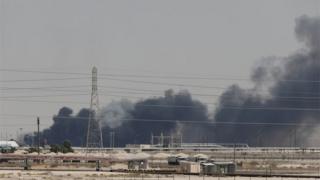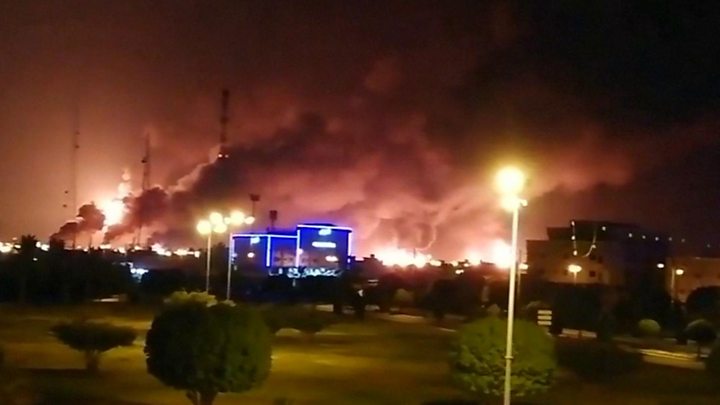 Image copyright
Reuters
Image copyright
Reuters
Oil prices surged by nearly 20% after two attacks on Saudi Arabian facilities on Saturday knocked out more than 5% of the world's supply.
Brent crude, the international benchmark used by oil traders, jumped to $71.95 a barrel at one point.
US oil prices also spiked, but both trimmed gains as President Donald Trump authorised the release of US reserves.
The strike, which the US blames on Iran, has sparked fears of increased risk to energy supplies in the region.
The price of Brent crude is currently up about 10% at $66.64 a barrel, while West Texas Intermediate is 9.5% higher at $60.06 after rising as much as 15% earlier.
The drone attacks on plants in the heartland of Saudi Arabia's oil industry hit the world's biggest petroleum-processing facility as well as a nearby oil field, both of which are operated by energy giant Aramco.
Together they account for about 50% of Saudi Arabia's oil output, or 5% of daily global oil production. It could take weeks before the facilities are fully back on line.
Aneeka Gupta, commodities strategist at the fund manager Wisdom Tree, says that higher oil prices would not have an immediate impact on consumers as they "could take a bit of time of feed through".
However, she says that if the outage lasts for more than six weeks, oil prices could hit "north of" $75 a barrel.
US Secretary of State Mike Pompeo claimed that Tehran was behind the attacks. Iran accused the US of "deceit."
Later Mr Trump said in a tweet the US knew who the culprit was and was "locked and loaded" but waiting to hear from the Saudis about how they wanted to proceed.
In another tweet he said there was "plenty of oil!".
Will petrol prices rise?
Drivers will not immediately see an increase at the pump, according to international energy policy expert Prof Nick Butler.
"The direct impact of the attacks could be short-lived," he said.
"The market has adjusted without blinking over the last two years to the loss for political reasons of over two millions barrels a day of production from Venezuela and Iran."
In the UK, 40% of the price of a litre of petrol is made up of oil, fuel production and profit. The rest is tax.
"There are currently savings in the wholesale price that have only just started to be passed on to drivers by retailers," says industry expert Simon Williams from automotive services company RAC Limited.
"Many retailers cut their prices by 3p on Friday and we believe that average prices were six pence too high before that, so the impact of these fires may not be too great."
However, if the drone attacks stoke broader tensions in the region, price rises could prove to be more sustained.
Prof Butler said that "if retaliation becomes a reality, any spike could be sustained feeding the risk of an economic recession".
What will be the impact on oil supplies?
The Saudis have provided little detail about about the attacks, apart from saying there were no casualties, but have given a few more indications about oil production.
Energy Minister Prince Abdulaziz bin Salman said some of the fall in production would be made up by tapping huge storage facilities.
The kingdom is the world's biggest oil exporter, shipping more than seven million barrels daily. Saudi stocks stood at 188 million barrels in June, according to official data.
"Saudi authorities have claimed to control the fires, but this falls far short of extinguishing them," said Abhishek Kumar, head of analytics at Interfax Energy in London. "The damage to facilities at Abqaiq and Khurais appears to be extensive, and it may be weeks before oil supplies are normalised."
Saudi Arabia is expected to use its reserves so that exports can continue as normal this week.

What are the US accusations?
Mr Pompeo said Tehran was behind the damaging attacks but gave no specific evidence to back up his accusations.
He has rejected claims by Yemen's Iran-backed Houthi rebels that they carried out the attacks.
Iran accused the US of "deceit" and its Foreign Minister Javad Zarif said that "blaming Iran won't end the disaster" in Yemen.
Yemen has been at war since 2015, when President Abdrabbuh Mansour Hadi was forced to flee the capital Sanaa by the Houthis. Saudi Arabia backs President Hadi, and has led a coalition of regional countries against the rebels.
The US meanwhile has blamed Iran for other attacks on oil supplies in the region this year, amid continuing tension following Mr Trump's decision to reinstate sanctions after abandoning the landmark international deal which limited Tehran's nuclear activities.